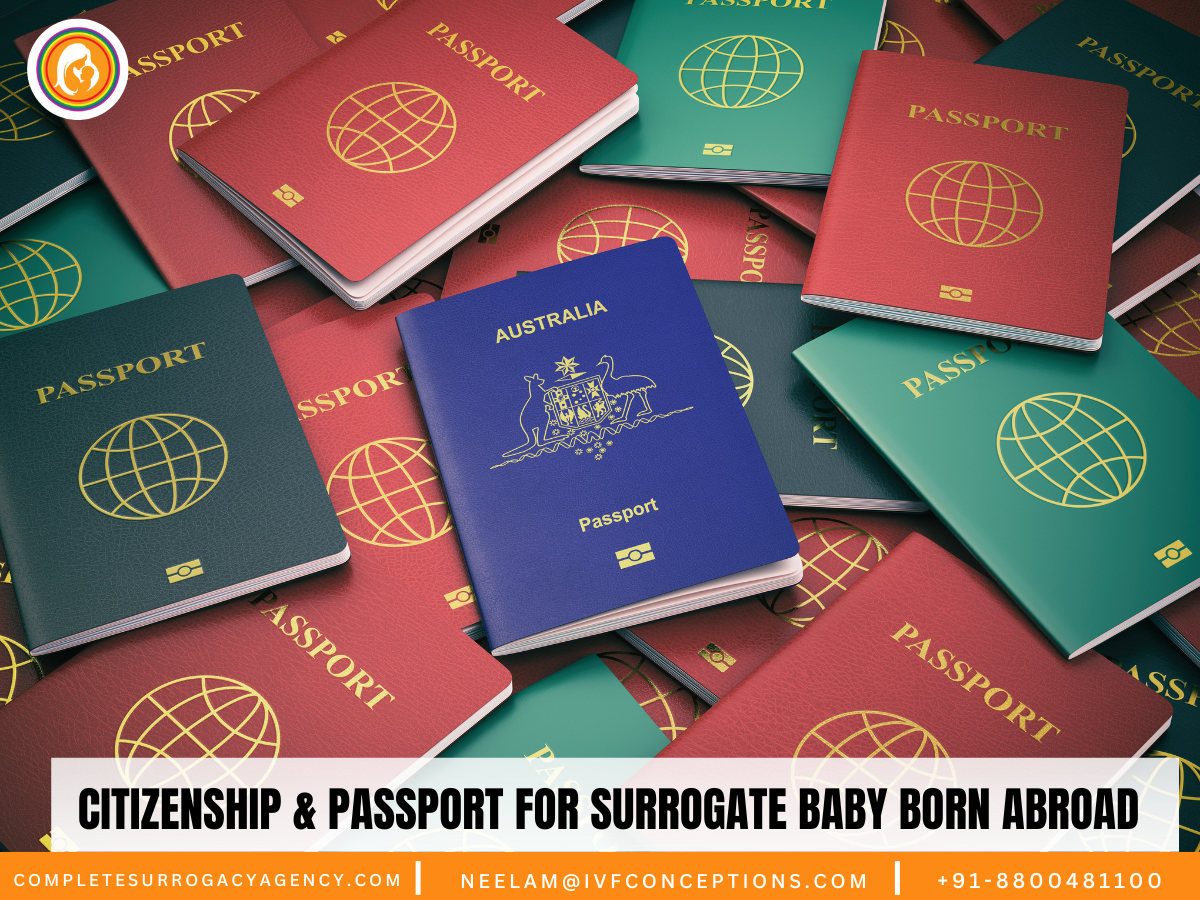Citizenship And Passport for Surrogate Baby Born Abroad

Citizenship & Passport for Surrogate Baby Born Abroad
Citizenship and Passport for Surrogate Baby Born Abroad: What Parents Need to Know
Did you know that surrogacy in the United States can cost around $100,000, while in some countries, it’s nearly one-third of that cost? This major price difference leads many intended parents to explore international surrogacy options. However, one critical concern remains—how to secure citizenship and a passport for a surrogate baby born abroad?
The U.S. Department of State determines whether a surrogate-born child qualifies for U.S. citizenship based on the Immigration and Nationality Act (INA). According to this law, a child must have a biological connection to a U.S. citizen parent to be eligible. In most cases, DNA testing is required to confirm this relationship before processing citizenship and passport applications.
- Book an online appointment: Get a free online consultation.
- Call\W:+91-8800481100 Email:neelam@ivfconceptions.com
Parents considering international surrogacy in 2025 should work closely with legal experts to ensure a smooth process for obtaining the baby’s citizenship and travel documents. Understanding the legal steps for citizenship, passport applications, and embassy procedures will help ensure a stress-free transition home with your newborn.
But, things get tricky if the baby is born to a surrogate in another country. If the baby isn’t related to a U.S. citizen by blood or by being carried by one, it might not get U.S. citizenship right away. This shows how important it is to know the laws and rules of international surrogacy well.
Key Takeaways
- Children born abroad to U.S. citizen parents may get U.S. citizenship at birth if they meet the INA’s conditions.
- DNA tests are often needed to prove a genetic link between the child and U.S. citizen parents.
- Children born to a surrogate overseas might not get U.S. citizenship automatically if they’re not related to a U.S. citizen by blood or surrogacy.
- Surrogacy in the U.S. is more expensive than in some other countries, pushing many parents to consider surrogacy abroad.
- It’s wise to talk to an immigration lawyer or an international surrogacy agency to understand the legal steps and plan for surrogacy abroad.
More Resources to Read:
Surrogacy Guide for Surrogate Mothers
Surrogacy Guide for Intended Parents
How does the surrogacy process work
Determining Child’s Citizenship at Birth
Getting U.S. citizenship for a child born abroad is complex. It depends on the parent’s U.S. citizenship, the parent-child bond, and the birth details. These factors help figure out the child’s citizenship at birth.

Requirements for Acquiring U.S. Citizenship
To get U.S. citizenship at birth, the child must have a link to a U.S. citizen parent. This link can be genetic or through gestation. The rules for passing on citizenship vary based on the parent’s marriage status and when the child was born:
- If the child is born in wedlock to two U.S. citizen parents, they get U.S. citizenship at birth if one parent lived in the U.S. before the child was born.
- Since November 14, 1986, the U.S. citizen parent must have lived in the U.S. for five years, with two of those years after turning 14.
- Between December 24, 1952, and November 13, 1986, the U.S. citizen parent needed to live in the U.S. for 10 years, with five after turning 14.
- A child born out-of-wedlock to a U.S. citizen father and an alien mother can get citizenship under certain conditions, like a blood link, financial support, and legal recognition of the child.
- Under INA 309(a), fathers can pass on U.S. citizenship to their children if they lived in the U.S. for five years before the child’s birth, with two of those years after turning 14.
- Children born out-of-wedlock to a U.S. citizen mother and an alien father from December 24, 1952, to June 11, 2017, can get citizenship if the mother lived in the U.S. for a year before the child was born.
- Since June 12, 2017, a child born out-of-wedlock to a U.S. citizen mother and an alien father can get citizenship if the mother lived in the U.S. for five years, with two years after turning 14.
Genetic or Gestational Relationship to U.S. Citizen Parent
The child’s link to the U.S. citizen parent is key in determining citizenship. A U.S. citizen father can pass on citizenship if he meets all the legal requirements.
A U.S. citizen mother, whether through genetics or adoption, can also pass on citizenship if she meets the legal criteria. If the U.S. citizen parent is not biologically related, they can still pass on citizenship if they are married to someone who is.
“Acquisition of U.S. citizenship by birth abroad to a U.S. citizen parent is governed by Federal statutes. Since 1790, there have been two prerequisites for transmitting U.S. citizenship at birth to children born abroad: a blood relationship to a U.S. citizen parent and the parent’s fulfillment of certain residency or physical presence requirements in the United States.”
Establishing Child’s Identity and Birth
When a U.S. citizen has a child abroad, like through a foreign surrogate, they can apply for a Consular Report of Birth Abroad (CRBA) or a U.S. passport. This is done at the U.S. embassy or consulate where the child was born. Intended Parents need to show proof of the child’s identity, birth, and citizenship. This includes medical and documentary evidence of the child’s birth, and proof of their genetic or gestational connection to their child.

Documentation Required for Consular Report of Birth Abroad
Parents also need to provide evidence of their own identity, citizenship, physical presence, or residence in the United States. They must also show their legal status as the child’s parent under local law. This can include:
- Birth certificates for the child and the U.S. citizen parent(s)
- Marriage certificate (if applicable)
- Proof of U.S. citizenship for the parent(s)
- Evidence of the parent(s)’ physical presence or residence in the United States
- Legal documentation establishing the parent-child relationship, such as adoption or surrogacy agreements
DNA Testing and Medical Evidence
In some cases, DNA testing and medical evidence are needed to prove the child’s connection to the U.S. citizen parent(s). Consular officers often ask for a DNA test result with a 99.99% or higher certainty. This proves the genetic link between a parent and child for passport and CRBA cases. Buccal (cheek or mouth cavity) swabs are the preferred method for DNA testing. They are non-invasive, painless, and easy to collect and send compared to blood samples.
| DNA Testing Accuracy | Preferred Collection Method |
| 99.99% Accuracy | Buccal (cheek or mouth cavity) Swabs |
In summary, getting a Consular Report of Birth Abroad or a U.S. passport for a child requires a lot of documents. These include proof of the child’s birth, the parents’ citizenship and legal status, and possibly DNA testing and medical evidence. This evidence shows the child’s genetic or gestational link to the U.S. citizen parent(s).
Obtaining Travel Documents for the Child
Parents of a child born abroad through surrogacy or ART need to get the right travel documents. If your child under 16 is a U.S. citizen, you can apply for a U.S. passport for them. But, all legal parents must agree to the passport’s creation.
Sometimes, if the surrogate mom is seen as the legal mother, her okay is needed for the passport. Unless there are special cases, that is. Also, in some places, a child born through surrogacy might not get citizenship there. This is because the surrogate mom might not be seen as the legal parent.
Applying for a U.S. Passport
Getting a U.S. passport for a child born abroad has its steps and needs. Parents must show the child’s identity, birth, and citizenship proof. This can be things like a Consular Report of Birth Abroad (CRBA) or DNA tests to link to a U.S. citizen parent.
- Collect all needed documents, like the child’s birth certificate and proof of your U.S. citizenship.
- Fill out the passport application form and make sure all legal parents agree.
- Send in the application and fees to a U.S. passport agency or an authorized place.
- Be ready to give more info or do DNA tests if the child’s citizenship or parent link is unclear.
Getting a U.S. passport for a child born abroad through surrogacy or ART is complex. It might need help from an immigration lawyer or consular staff. It’s key to follow the legal steps and gather the right documents for a successful application.
Listing Parents on the Child’s Citizenship Documents

When a child is born abroad to U.S. citizen parents, the U.S. government issues a special document called the Consular Report of Birth Abroad (CRBA). This document confirms the child’s U.S. citizenship from birth. It lists the names of the U.S. citizen or national parents who have a genetic or gestational link to the child.
The CRBA must include the parent(s) through whom the child claims U.S. citizenship. Sometimes, a parent not passing on citizenship can be listed if they provide proof of a link to the child and the other parent agrees.
Over time, the rules for listing parents on the CRBA have changed. In 2014, new rules made it clear that a child born abroad to a U.S. citizen parent is a U.S. citizen. But, a child born through surrogacy to one U.S. citizen parent is seen as “born out of wedlock” for citizenship.
For “born out of wedlock” cases, parents must show DNA tests proving their link to the U.S. citizen parent. They also need to prove they can support the child financially. The State Department wants to see they’ve lived in the U.S. for at least five years before the child was born.
Same-sex couples have faced extra challenges in getting U.S. citizenship for their children. In some cases, the State Department has denied citizenship to one twin born through surrogacy to a same-sex couple, where one twin was linked to an Israeli citizen.
To help with these issues, the American Bar Association passed a resolution in 2017. They suggested changes to the Immigration and Nationality Act to help children born through assisted reproduction. In 2021, USCIS updated its rules to make it clearer how children born through ART get citizenship.
| Scenario | Citizenship Requirements |
| Child born in-wedlock to one U.S. citizen parent and one foreign national parent | Child must document five years of physical presence in the U.S. prior to birth |
| Child born in-wedlock to two U.S. citizen parents | One parent must have resided in the U.S. at any time before the child’s birth |
| Child born out of wedlock to U.S. citizen parent(s) | Parents must provide DNA tests proving genetic link to U.S. citizen parent and demonstrate financial support capability; U.S. citizen parent must have been physically present in the U.S. for at least 5 years before child’s birth |
Getting a Consular Report of Birth Abroad (CRBA) for a child born abroad costs $100 USD. You can pay with cash (in U.S. Dollars or Bolivianos) or by credit card (Mastercard, Visa, Diners Club, Discover, American Express). You need to book an appointment for the CRBA application. Everyone going to the appointment must be signed up in the system.
Citizenship and passport for surrogacy baby birth abroad
Legal Parentage Under Local Laws
Understanding the Surrogacy laws of the country where you plan to have a baby through surrogacy is key. If your surrogacy plan doesn’t fit the laws of the foreign country, it can be hard to make the child a U.S. citizen. Sometimes, clinics in other countries might use different sperm or eggs by mistake or on purpose.
This mistake can leave the child without citizenship and make it hard to get travel papers. Parents thinking about surrogacy abroad should do their homework and talk to an immigration lawyer first. The rules for surrogacy vary a lot by country, and following them is key to getting the child’s citizenship and passport.
Surrogacy Laws and Regulations in Foreign Countries

Surrogacy laws and rules change often and are complex worldwide. Some places like Switzerland, Italy, and Singapore don’t allow surrogacy. But, countries like the UK, Australia, Colombia, Ireland, Denmark, Belgium, and the Netherlands do allow it for altruistic reasons. Then, there are countries like Kenya and Mexico where surrogacy isn’t regulated.
Getting a passport and citizenship for a surrogacy baby also depends on the country. U.S. citizens need to register their baby’s birth with the embassy and get a passport before coming back home. In the UK, for instance, parents need a Parental Order from UK courts to prove the child’s parentage, citizenship, and legal status.
It’s important to look into the legal steps and work with an immigration lawyer for a successful surrogacy journey, no matter where you are.
“Consultation with an immigration attorney is recommended for U.S. parents considering foreign surrogacy arrangements due to the complexity involved in navigating citizenship and passport issues for children born abroad through Assisted Reproductive Technology.”
More Resources to Read:
Infertility Treatment and Surrogacy Process
9 Factors To Improve IVF Pregnancy Rate
International Surrogacy Options Worldwide
Surrogacy Guide for Surrogate Mothers
Conclusion
Getting citizenship and a passport for a child born through surrogacy abroad is complex. It involves legal steps, paperwork, and immigration rules. You must prove the child’s link to a U.S. citizen parent and understand the laws of the foreign country.
It’s wise to talk to an immigration lawyer for a smooth process. They can help with the paperwork and make sure you follow all the rules. This is true for both the foreign country and the U.S.
Surrogacy and international adoption can be both rewarding and tough. By being proactive and getting professional advice, you can get through the process. This way, you can bring your child home and start your family’s new chapter with confidence.
Our team has over 14 years of experience facilitating surrogacy arrangements, egg donation, and serving as an advocacy resource for infertile couples and LGBTQ individuals seeking to build families. Till now we have helped and supported thousands of the intended parents with their family-building journey, and we can help you as well. Happy to share the references from the past IPs if needed.
If you’d like to learn more about IVF, Egg Donation, or surrogacy services globally, check out the rest of our website at Complete Surrogacy Agency. We offer legally secure and affordable surrogacy consulting services for FREE.
Get in touch for FREE SURROGACY CONSULTING:
Mobile: +91-8800481100 ( WhatsApp, Line, Viber)
Email: neelam@ivfconceptions.com

FAQ for citizenship and passport for surrogacy baby born abroad via surrogacy process
What are the requirements for a child born abroad to a U.S. citizen parent to acquire U.S. citizenship at birth?
A child born abroad gets U.S. citizenship if they have a genetic or gestational link to a U.S. citizen parent. The U.S. citizen parent must also meet certain legal requirements under the Immigration and Nationality Act.
How can a U.S. citizen parent establish their genetic or gestational connection to a child born abroad through surrogacy?
DNA testing is often the best way to prove a genetic link between the U.S. citizen parent and the child after birth. If the U.S. citizen parent is the gestational mother, showing medical and documentary proof of the child’s conception and birth can prove the gestational connection.
What documentation is required to apply for a Consular Report of Birth Abroad (CRBA) or U.S. passport for a child born abroad to a U.S. citizen parent?
Parents need to provide proof of the child’s identity, birth, and citizenship. This includes medical and documentary evidence of the child’s conception and birth, and proof of their genetic or gestational link to the child. They also need to show their own identity, citizenship, and proof of being in the United States. Additionally, they must show they are legally the child’s parent under local laws.
How can a U.S. citizen parent obtain a U.S. passport for their child born abroad through surrogacy?
If your child under 16 is a U.S. citizen, you can apply for their U.S. passport. All legal parents must agree to the passport’s issuance. If the surrogate mother is seen as the legal mother, she must consent to the passport unless an exception applies.
How are the parents listed on the child’s citizenship documentation when born through surrogacy?
The CRBA lists the U.S. citizen or national parent(s) with a genetic or gestational link to the child. A parent not passing on U.S. citizenship can be listed if they provide proof of a connection and the parent passing citizenship agrees.
What are the legal considerations when pursuing international surrogacy?
Not following local laws in your surrogacy agreement can make it hard to document the child as a U.S. citizen. Parents should look into their options carefully and talk to an immigration lawyer before going ahead with international surrogacy. The legal rules can change a lot based on the country involved.
Source Links
- Assisted Reproductive Technology (ART) and Surrogacy Abroad
- Will Our Surrogate Child Born Overseas Acquire U.S. Citizenship From Us?
- Report the Overseas Birth of a U.S. Citizen Child
- Acquisition of U.S. Citizenship by a Child Born Abroad

Author Bio: Neelam Chhagani is an International Surrogacy Expert with 15 years of experience in the fertility and surrogacy domain. As the founder of IVF Conceptions and Complete Surrogacy, she has guided over 4,000 intended parents worldwide on their surrogacy journey to parenthood. Recognized as a trusted authority, she specializes in holistic infertility solutions and third-party reproduction consulting.
Holding an MA in Counselling Psychology and a PGD in Mental Health, Neelam is a proud member of the European Fertility Society (EFS) and the European Society of Human Reproduction and Embryology (ESHRE). She is also a leading surrogacy blogger, providing valuable insights into ethical and practical surrogacy solutions.
Since 2010, committed to supporting ALL family types, Neelam has been passionate about helping intended parents grow their families with compassion, integrity, and a focus on secure and affordable surrogacy options Globally.
Learn more about Neelam:
https://www.ivfconceptions.com/neelam-chhagani-surrogacy-consultant/
https://www.linkedin.com/in/neelam-chhagani-92892229/















I was introduced to Neelam by a friend who worked with Neelam for surrogacy. Neelam is absolutely wonderful. I am a single male and the journey to fatherhood is not that easy. Neelam connected me to a program ideal for my circumstances. She was with me throughout the pregnancy providing advice and guidance along the way. I am so grateful I found her and am thrilled today that I have a beautiful daughter. I highly recommend Neelam to anyone who is on a journey to become a parent. Having a child has changed my world for the better. I wish others success with their own journey and recommend you connect with Neelam to find a path that is best for you.
SA (USA)